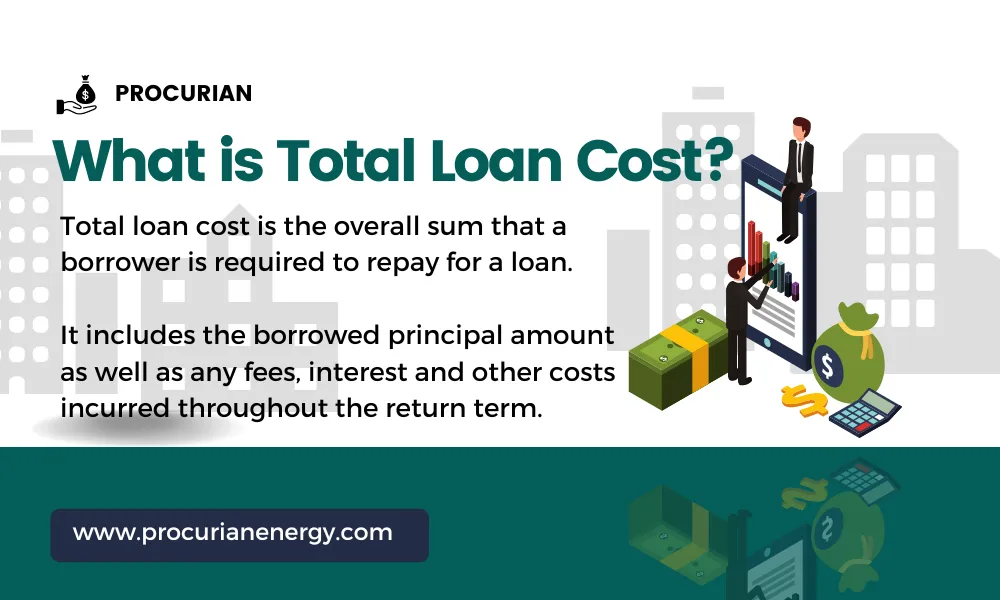Welcome to ProCurian!
When it comes to loans, reducing the total loan cost is a smart financial move.
You may eventually save a sizable quantity of money by minimizing the interest paid and making the greatest use of the terms of your loans.
This blog post will suggest 15 best and proven strategies that can reduce your total loan cost and provide you more financial freedom.
What is Total Loan Cost?

Before delving into strategies, it’s essential to understand the fundamentals of loans.
Total loan cost is the overall sum that a borrower is required to repay for a loan. It includes the borrowed principal amount as well as any fees, interest and other costs incurred throughout the return term.
There are several different loan kinds, including personal, home and student loans.
Familiarize yourself with terms like interest rates, principal and loan agreements.
Reading loan agreements carefully is crucial to fully comprehend the terms and conditions you are agreeing to.
What increases your total loan balance?
Your total loan balance can increase due to several factors. These include:
- the accrual of interest on the outstanding principal amount,
- late payment fees,
- penalties for non-compliance with loan terms, and
- any additional charges or fees associated with the loan.
Taking on new loans or increasing existing loan amounts can also contribute to an increase in your total loan balance. It’s important to manage your loans responsibly to minimize the growth of your loan balance.
Evaluate Your Current Loan Situation
Begin by reviewing your existing loans. Take note of the interest rates, loan balances and repayment terms for each loan.
You can clearly see how much interest you’re now paying by calculating your current total loan cost.
Total Loan Cost Calculator
Identify any loans with high-interest rates or unfavorable terms that may be costing you more than necessary.
Strategies to reduce your total loan cost
Reducing the total cost of your loan is a prudent financial move that might ultimately save you money.
You may employ a number of strategies to lower the overall cost of any loan including mortgages, auto loans, student loans and others. Here are some wise strategies to consider:
1) Shop around for the best interest rates
Start by researching different lenders and comparing interest rates and terms.
Over time, even a small percentage point difference in interest rates might result in significant savings.
Take the time to negotiate with lenders to secure the most favorable rate possible.
2) Improve your credit score
Your credit score has a significant impact on the loan interest rate you will be charged.
Better credit scores are frequently associated with lower interest rates, which decreases the overall cost of your loan.
To improve your credit score:
- pay your bills on time,
- reduce your debt-to-income ratio, and
- remove any errors from your credit report.
3) Opt for a shorter loan term
While longer loan terms may offer lower monthly payments, they also result in higher total loan costs due to the additional interest paid over time.
Consider opting for a shorter loan term if you can comfortably afford higher monthly payments.
This will reduce the total amount of interest you pay and allow you to repay the loan faster.
4) Make larger down payments
By making larger down payments, you can reduce the principal amount borrowed and, subsequently, the total loan cost.
Saving diligently and accumulating a significant down payment can help you secure more favorable loan terms and save on interest charges in the long run.
5) Make biweekly payments
Instead of making monthly payments, consider switching to biweekly payments.
By doing so, you’ll make 26 half-payments each year, which is equivalent to 13 full payments.
By making this extra payment, you might be able to pay off the loan more quickly and accrue less interest overall.
6) Make additional payments towards the principal
One effective strategy is to make extra payments towards the principal of your loans. By doing so, you can reduce the outstanding balance and the overall interest paid.
Consider allocating any extra income, such as bonuses or tax refunds, towards these additional payments.
You may also save money by reducing non-essential spending or looking for extra sources of income.
7) Refinance your loans
Loan refinancing involves replacing your existing loan with a new one that offers better terms.
Research and compare different lenders to find lower interest rates or better repayment options. Refinancing can be especially beneficial if you have high-interest loans.
Be mindful of any fees associated with refinancing and carefully evaluate the long-term savings.
8) Consolidate your loans
If you have many loans with varied interest rates and repayment periods, consolidating them into one loan might simplify your finances and perhaps cut your overall loan cost.
By consolidating, you can secure a fixed interest rate and potentially extend the repayment period, resulting in lower monthly payments.
However, consider the potential drawbacks such as extending the overall repayment duration and possible fees.
9) Negotiate with lenders
Don’t ever underestimate the power of negotiation.
You ought to discuss with your lenders the possibility of renegotiating the terms of your loans.
- Explain your financial situation,
- demonstrate your commitment to repayment and
- inquire about potential options such as interest rate reductions or waiving of certain fees.
Effective communication can lead to favorable outcomes.
10) Avoid late payments and fees
Late payments not only damage your credit score but also incur additional fees and penalties.
To minimize your total loan cost, it’s crucial to make all payments on time and avoid any unnecessary charges.
Set up automatic payments or reminders to ensure you never miss a due date.
11) Avoid Common Loan Mistakes
Avoiding frequent mistakes is crucial if you want to lower the total cost of your loan.
Before agreeing to a loan, be on the lookout for predatory lending tactics and do your homework on potential lenders.
Be mindful of any possible fees and charges related to your loans as they may have a big influence on the overall cost.
Finally, avoid going into more debt than you have to since doing so will only make your financial situation worse.
12) Avoid unnecessary loan add-ons
Some lenders may try to upsell additional services or add-ons to your loan, such as:
- payment protection insurance or
- extended warranties.
While these options may provide some benefits, they can also increase the total loan cost.
Evaluate the necessity and cost-effectiveness of these add-ons before accepting them.
13) Monitor and Manage Your Finances
To stay on top of your loan costs, implement effective financial management practices.
Create a budget to keep track of your earnings and outgoing costs so that you can assess your financial situation clearly.
- Regularly review your loan status,
- keeping an eye on interest rate changes or
- opportunities for refinancing.
Adjust your financial strategy as needed to maximize savings and minimize costs.
14) Pay attention to prepayment penalties
Many loans have prepayment penalties, or fees assessed if you return a loan early.
Check your loan’s conditions to check if there are any prepayment penalties before making extra payments or refinancing.
If such penalties are applicable, assess the expenses against any potential savings on interest.
Prepayment could still be favorable financially in some situations, but it’s crucial to consider the overall picture.
15) Seek Professional Advice
Consider consulting financial advisors or experts who can provide personalized guidance based on your unique financial situation.
They can help you navigate the complexities of loans and assist in determining the most effective strategies to reduce your total loan cost.
Professional advice can be particularly beneficial when dealing with complex loans such as mortgages or business loans.
FAQs
What is the total loan cost?
The total loan cost is the combined amount of the principal loan amount and the interest paid over the loan term.
How can I reduce the interest rate on my loan?
To reduce the interest rate on your loan, consider:
-improving your credit score,
-negotiating with the lender,
-refinancing the loan, or
-exploring alternative lenders with lower rates.
Can I make additional payments to reduce the total loan cost?
Yes, making extra payments towards your loan can significantly reduce the total loan cost. By paying more than the required monthly installment, you can decrease the principal balance faster, resulting in less interest accumulating over time.
Are there any prepayment penalties if I make extra payments on my loan?
Some loans may have prepayment penalties that are fees charged by lenders if you pay off your loan before the specified term. It’s essential to review your loan agreement or consult with your lender to determine if any prepayment penalties apply.
Can refinancing help reduce my total loan cost?
Yes, refinancing can potentially lower your total loan cost by obtaining a new loan with better terms such as a lower interest rate or longer repayment period.
Should I consider consolidating my loans to reduce costs?
Consolidating your loans may be a good way to lower your overall loan costs. You could be eligible for a lower interest rate or a longer payback period by merging many loans into one, which would result in smaller monthly payments and possible cost savings.
Is it advisable to negotiate with my lender for better loan terms?
Yes, it’s worth trying to negotiate with your lender for better loan terms. Lenders may be open to discussing interest rate reductions, fee waivers or other adjustments to your loan terms, especially if you have a good payment history or can demonstrate financial hardship.
How does increasing the loan term affect the total loan cost?
Increasing the loan term (the length of time to repay the loan) typically reduces the monthly payments but may increase the total loan cost. While longer terms result in lower monthly installments, you’ll end up paying more in interest over the extended repayment period.
Are there any loan repayment assistance programs available?
There are debt repayment aid programs offered by governmental or nonprofit groups, depending on your circumstances and area. These initiatives may include loan forgiveness, income-driven repayment plans or other types of support that can help lower the overall cost of your debt.
How can you reduce your total loan cost for school?
You can reduce your total loan cost for school by applying for scholarships, grants and work-study programs, and by making extra payments to pay off your loans faster.
How can you reduce your total loan cost in college?
To reduce total loan cost in college, consider scholarships, grants and part-time jobs to minimize borrowing. Create a budget, live frugally and explore loan repayment options after graduation.
Conclusion
Reducing your total loan cost is a proactive step towards achieving financial freedom.
By understanding-
- the basics of loans,
- evaluating your current loan situation, and
- implementing smart strategies.
you can significantly reduce the burden of interest payments and save money in the long run.
Avoid common loan mistakes, seek professional advice when needed and maintain a proactive approach to managing your finances.
With careful planning and execution, you can pave the way to a brighter financial future.









